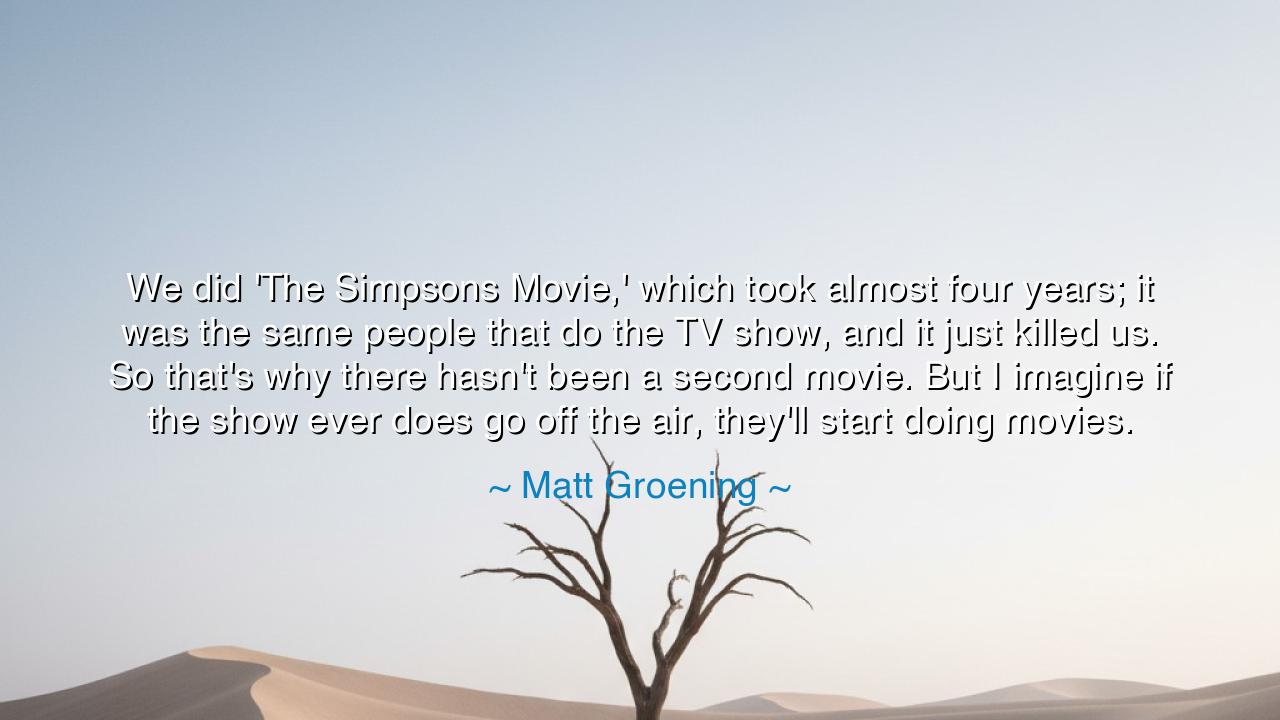
We did 'The Simpsons Movie,' which took almost four years; it
We did 'The Simpsons Movie,' which took almost four years; it was the same people that do the TV show, and it just killed us. So that's why there hasn't been a second movie. But I imagine if the show ever does go off the air, they'll start doing movies.






Hear now the words of Matt Groening, the visionary creator who brought The Simpsons into the world: “We did 'The Simpsons Movie', which took almost four years; it was the same people that do the TV show, and it just killed us. So that's why there hasn't been a second movie. But I imagine if the show ever does go off the air, they'll start doing movies.” These words, though seemingly simple, speak to a truth known by all who endeavor to create something of lasting significance—that the process of creation is a journey of immense effort and sacrifice. It is a reminder that even in the pursuit of something beloved, the toll on the soul and the body can be profound.
In the days of ancient Greece, the bards would gather to sing their epics, and those who created the great dramas for the theaters of Athens knew that the process of creation was not one of ease. Sophocles, the great playwright, would labor for months, even years, to craft his tragedies, each word a step toward the inevitable conclusion, each performance a sacrifice of his very energy and time. Though his works were loved by all, the toll on him was unspoken but understood—the creation of art, especially something that would endure through the ages, is never a light task. Groening’s words reflect this ancient truth: that even the most beloved creations demand great energy, sometimes at the cost of the creator's very vitality.
Let us consider the tale of Michelangelo, who, while creating the Sistine Chapel ceiling, was plagued by fatigue, illness, and the overwhelming pressure of his work. Though the world now marvels at the beauty and grandeur of his creation, few realize the true weight that hung over Michelangelo during those years. He was not simply painting, he was living the struggle of a creator who saw his work as an offering to the gods. In a similar manner, Groening’s efforts with The Simpsons Movie were not just a continuation of a show; they were the result of years of intense labor and personal sacrifice. Like Michelangelo, the very act of creation—be it a movie, a painting, or a play—is never a matter of simple labor, but of soul and spirit.
Groening’s reflection on why a second movie has not emerged from the Simpsons universe speaks to a universal truth: the act of creation, when done to the highest standard, can be so consuming that even the most passionate of artists must pause, must take a step back. The creators of The Simpsons Movie poured their very beings into the project, their energy stretched to the limit by the need to maintain the integrity of the show while transitioning it to a new, more expansive medium. This is the nature of great work: it demands dedication, focus, and at times, exhaustion. It is not for the faint-hearted, but for those who are willing to sacrifice for the sake of something greater than themselves.
Reflect, O seekers, on the wisdom of Confucius, who spoke of the importance of discipline and sacrifice in the pursuit of greatness. He said, “The superior man is one who, when he has made a mistake, admits it and seeks to correct it.” In this, we find the essence of Groening’s words. The toll of the creative process is not something to be feared, but something to be embraced. It is only by dedicating oneself fully to a cause, no matter how exhausting, that true mastery is achieved. Just as Confucius recognized the importance of self-awareness and dedication in personal growth, so too must creators like Groening understand the balance between pushing forward and knowing when to rest.
In Groening’s words, there is also a lesson about the nature of timing and the value of patience. The idea that movies may come when the show “goes off the air” speaks to a fundamental truth in the creative process: that things must unfold in their own time. The artist must not rush their work, nor allow the pressure of external expectations to dictate the pace of creation. Great works often require time to fully develop, to grow, to find their true voice. This is not a failure of the artist, but a recognition of the natural rhythm of the creative process. Just as the seasons follow their own course, so too does the artist’s journey unfold when it is meant to.
Thus, the lesson is clear, O future generations: creation is a path of dedication and sacrifice, but it is also a path that requires patience and timing. Groening’s words remind us that great work does not come easily, nor should it be rushed. Whether you are creating art, ideas, or movements, know that the journey will be long and demanding, but it is also rewarding. Learn to recognize the moments of exhaustion and reflection, and know that they are a natural part of the process. Just as Michelangelo, Sophocles, and Confucius all understood, greatness comes not from hasty work, but from dedication to the craft and the wisdom to recognize when to pause and when to continue. In the end, it is the quality of your work, not its speed, that will define its legacy.






AAdministratorAdministrator
Welcome, honored guests. Please leave a comment, we will respond soon